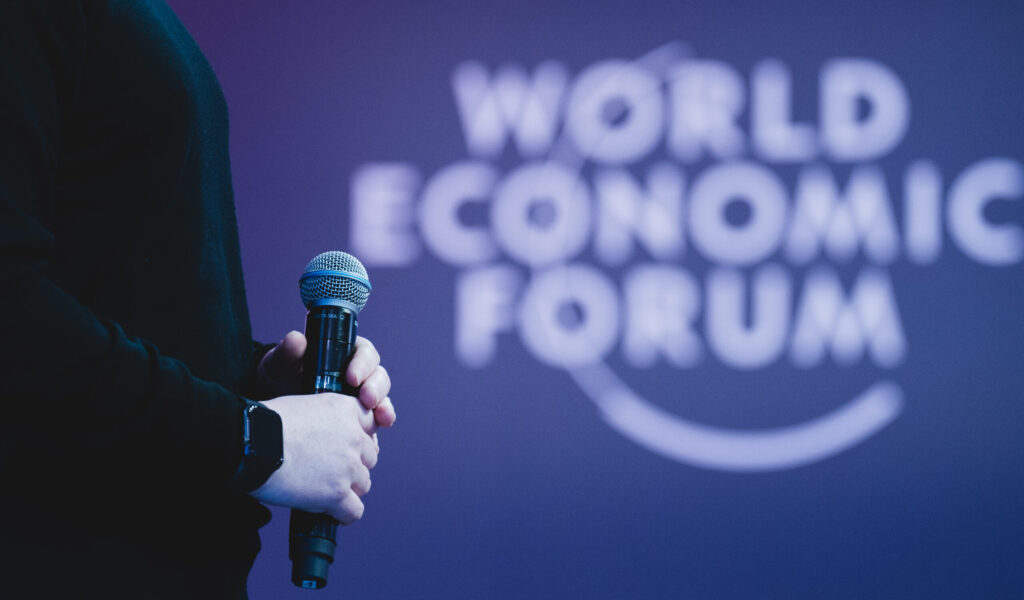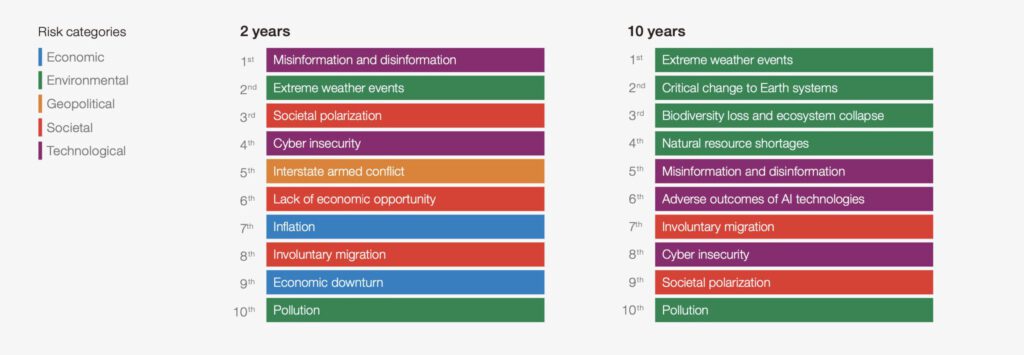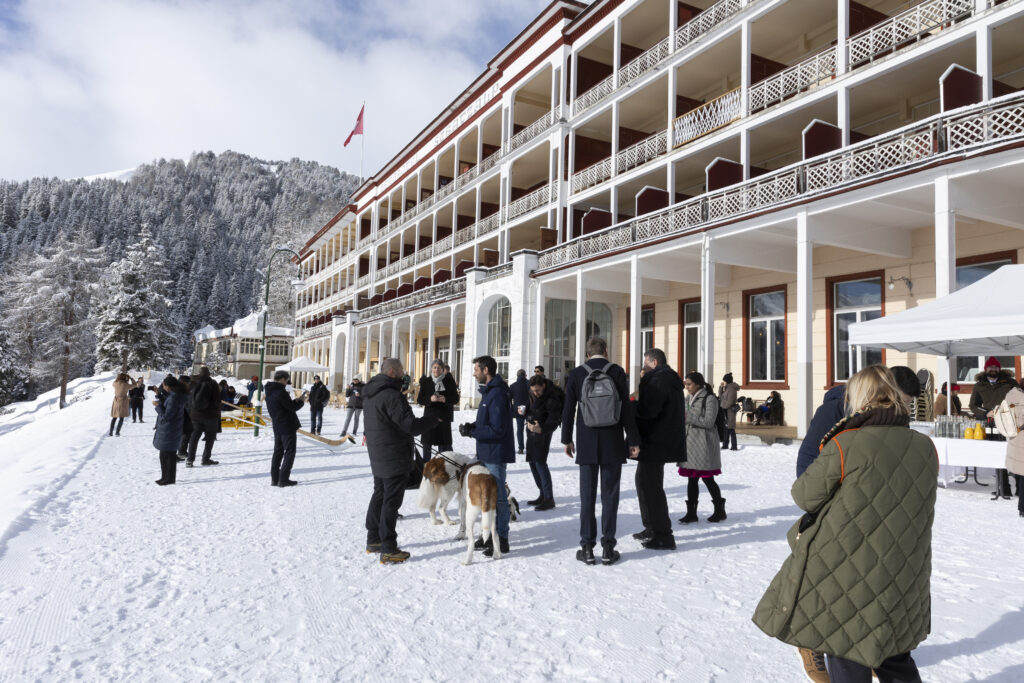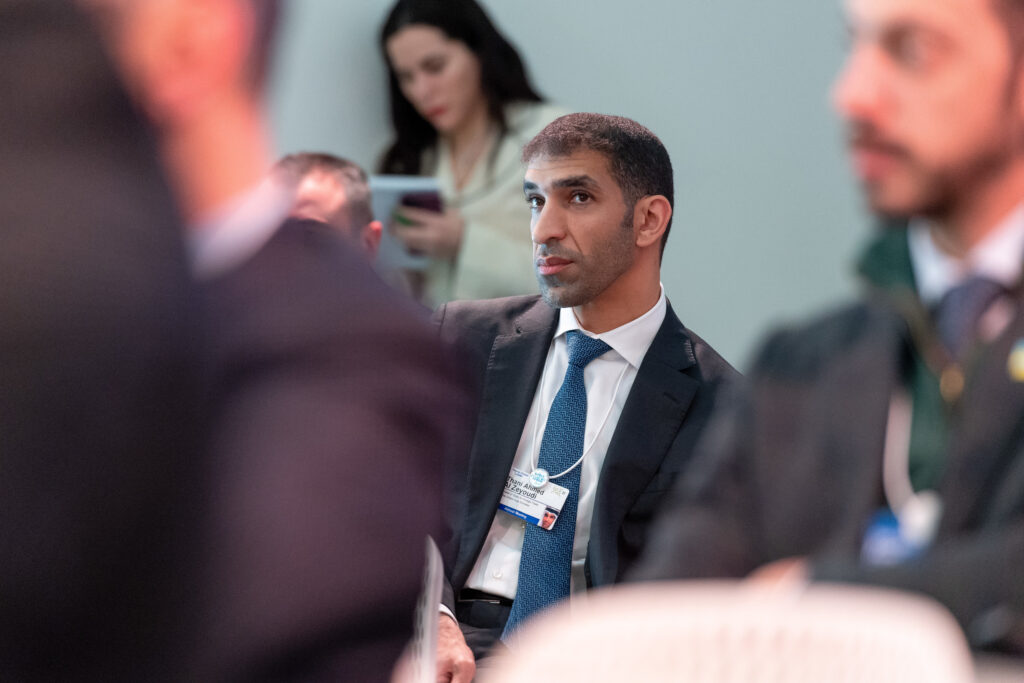
The World Economic Forum WEF is a platform for big speeches. But really important is what gestures mean and what happens in the background.
Hardly anyone notices anything historic at the annual meeting of the world’s elite in Davos.
The World Economic Forum (WEF) is the meeting place for top politicians, business leaders, intellectuals and activists from all over the world to discuss the most pressing challenges of our time and to explore innovative solutions.
Climate suddenly irrelevant
The personalities often spout big speeches and relish speaking into the numerous media microphones. But none of the circus is really important. Who remembers the girl who wanted to wake up the whole world to climate change in Davos? Probably hardly anyone.
After all, climate change is no longer the most burning issue in the world. In the run-up to the Davos event, the WEF announced that the risks had changed completely.
In fact, the WEF’s Global Risk Report 2024 stated that the world’s risk situation had changed significantly compared to the previous year.

The climate takes a back seat in the short term and influencing elections through disinformation using artificial intelligence (AI) becomes a world risk.
Switzerland with oddities
The main topic of discussion at this year’s WEF was the possible second term in office for Donald Trump.
Only then did the problems surrounding the war in Ukraine, the increasing attacks by Houthi rebels in the Red Sea on the global economy, the escalating conflict in the Middle East and the dire words from central bankers warning that interest rate cuts will probably not happen as quickly as expected.
Switzerland announced a peace plan for Ukraine in Davos in the presence of Ukrainian President Volodimir Zelensky, although the aggressor, Russia, was not even present. That is bizarre.
Switzerland courted Chinese Prime Minister Li Qiang and signed something in addition to Switzerland’s existing free trade agreement with the Middle Kingdom. However, when asked by muula.ch, no one wanted to explain exactly what this meant.
Keller-Sutter’s stutter
All of this happens on the surface anyway and the media report on it dutifully, provided the tabloids don’t make a fuss for the hundredth time about the high Davos prices or escort service business at the WEF.
Swiss Finance Minister Karin Keller-Sutter told Bloomberg TV at the WEF that she was in favor of the Swiss Financial Market Supervisory Authority Finma having the power to impose fines.
Logically, the politician then immediately rowed back: “But it is too easy to say that the problem is solved if it can sanction banks”. It is a difficult task to be stricter but remain competitive.
That’s how it sounds in the foreground when Keller-Sutter wants to please everyone.
Left versus right
Among this year’s 3,000 guests from more than 125 countries, two personalities caused a particular stir. On the one hand, the new President of Argentina, Javier Milei, who settled accounts with climate hysteria and women’s quotas and declared that the world must finally rid itself of the scourge of socialism.
On the other hand, just such a leftist caused criticism, as the President of Colombia, Gustavo Petro, defended renting a house for one million dollars over just four days, even though millions in his home country live in abject poverty.

Milei’s journey to Davos by public transport on his first trip abroad as President of Argentina could even be a good example for the Colombian socialist and former guerrilla fighter Petro.
Amherd on the EU’s coat tails
Whether it is important that Swiss President Viola Amherd was sitting next to EU Commission President Ursula von der Leyen is a moot point.
What is more important is that the EU leader did not even have 15 minutes of time for the highest-ranking Swiss woman at the WEF.
You just have to set priorities. And that’s exactly what many people do.
Negotiations in the background
After all, who was aware of the most important backroom deals at the WEF? Hardly anyone.
What did Keller-Sutter discuss with Saudi Arabia’s finance minister Mohammed al Jadaan? Nobody knows.
Actually, the Swiss Minister of Economic Affairs, Guy Parmelin, should have spoken to the Arab, as he is traveling to the Saudi kingdom with a business delegation from Switzerland at the beginning of February.

However, as the New York Times reported on the last WEF, even the Arabs and Jews came very close in Davos, which was actually unthinkable from an official point of view.
For example, Israel demonstrably deepened contacts with the United Arab Emirates, which were already cooperating in the water business through the Watergreen company.
Israeli approaches Saudi
Saudi Arabia and Jordan are also forging more and more links with Israeli activities in tourism, defense and even environmental protection.
At this year’s World Economic Forum in Davos, Israeli President Izchak Herzog even spoke out in favor of his country’s rapprochement with Saudi Arabia. Years ago, this would have been unthinkable. The Saudi nodded proudly.
Such rapprochement at the WEF is truly historic. But the public hardly notices – despite the throng of hundreds of journalists descending upon Davos.
19.01.2024/kut./ena.





